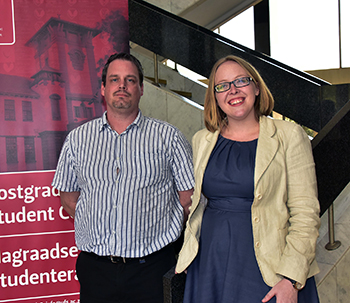Latest News Archive
Please select Category, Year, and then Month to display items
06 November 2023
|
Story MBALI MABOEA
|
Photo SUPPLIED
 The Department of Geography on the UFS Qwaqwa Campus recently played host to the Society of South African Geographers Conference (SSAG 2023), which gathered more than 100 students over three days.
The Department of Geography on the UFS Qwaqwa Campus recently played host to the Society of South African Geographers Conference (SSAG 2023), which gathered more than 100 students over three days.
Fostering academic growth, collaboration, and inspiration among students and researchers in the field of geography, the Department of Geography on the UFS Qwaqwa Campus recently played host to the Society of South African Geographers Conference (SSAG 2023), which gathered more than 100 students over three days.
Following a five-year hiatus, the three-day conference comprised student proposal presentations in different fields: human geography, environment geography, geoinformatics, and physical geography, divided into breakaway sessions over two days. Furthermore, day three of the annual conference included an excursion to the Basotho Cultural Village and Clarens.
The three-day annual student conference focused on different themes presented by two main speakers. The topic of the first keynote speaker, Dr Mahlomola Daemane, General Manager of the SANParks Arid Research Unit, focused on the contemporary conservation, transition, and relevance of science in policy and decision making.
The second keynote speaker was Dr Felicia Akinyemi, a Marie Sklodowska-Curie Research Fellow affiliated with the Institute of Geography at the University of Bern in Switzerland. Her work focuses on the intersection of geoinformatics, global change, and sustainability. Dr Akinyemi focused her talk on the integrative geospatial methods and metrics for sustainable land use. She introduced different techniques and metrics and gave students insight in early-career African research.
Speaking about the success of the conference, Nthebohiseng Sekhele, Geography Lecturer on the Qwaqwa Campus and chair of the organising committee, said, “The local organising committee was also very impressed with the quality of presentations from our postgraduate students in Geography, as well as the robust discussions that happened during the parallel sessions in the two days of the conference. We had a positive response of physical and online participation from many universities across South Africa. We are pleased that we have achieved our goal with this conference, which is to inspire the next generation of geographers.”
National 3MT competition held at UFS
2017-03-29

The two winners of the Three minute thesis
competition, Andrew Verrijdt (left) and
Kerryn Warren (right).
Photo: Charl Devenish
From Neanderthal hybrid children to eating corn silk as a way of managing kidney diseases, the National Three Minute Thesis competition (3MT) captivated the mind.
“We brought the competition to South Africa and hosted the local, regional, and national competitions for the past few years,” said Dr Emmie Smit, organiser of the event. It is an opportunity to raise the profile of postgraduate research and to develop a cross-disciplinary student community to effectively communicate research to a wide audience. The event was founded by the University of Queensland, Australia. The third national 3MT competition took place at the University of the Free State (UFS) on Friday 24 March 2017.
Three minutes and one slide
During the competition, participants had three minutes to explain their master’s or doctoral research and one static PowerPoint slide could be used. “It is very important that this slide works for you. There must be some way the information on the slide connects to what you present,” said Dr Henriette van den Berg, Director of the Postgraduate School at the UFS.
Winners grateful for opportunity
“It is an honour and a drive. It is very nice to have this sort of thumbs up,” said Kerryn Warren, winner of the Science category. Her research title was, What did a Human-Neanderthal Child Look Like? “I have been looking at the hybrids between different species and subspecies of mice in order to use them as a model to find out what human hybrids looked like.”
The presentation by Andrew Verrijdt, winner of the Humanities category, entitled Hiding in the Deep: Anonymous Websites for Paedophiles on the ‘Darknet’, gave a glimpse into the mysterious and dangerous realm of the dark web. “I am grateful for the opportunity. Primarily because I think it’s an important topic, and society will benefit by getting the word out there as it is a sensitive topic,” he said. The two winners, both from the University of the Cape Town, won R15 000 each. A further R30 000 of prize money went to the four runners-up.